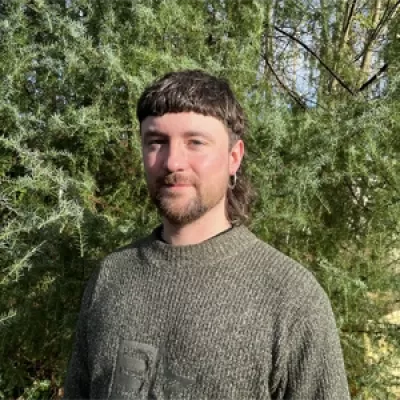Dr Jonathon Turnbull
Postdoctoral Researcher in More-than-human Geography
Member of the Leverhulme Centre for Nature Recovery
Junior Research Fellow (and International Fellow) of Jesus College, Oxford
Postdoctoral Researcher in More-than-human Geography
Member of the Leverhulme Centre for Nature Recovery
Junior Research Fellow (and International Fellow) of Jesus College, Oxford
Academic Profile
Jonathon is a cultural, environmental, and urban geographer from Newcastle upon Tyne. His research examines how understandings of nature are produced and contested across geographical contexts and why this matters for more-than-human social, political, and economic life.
Джонатон є культурним, енвайроментальним та урбаністичним географом родом із Ньюкасла-на-Тайні. У своїх студіях він вивчає, як формують і заперечують розуміння природи в різних географічних контекстах і чому це має цінність для поза-людського соціального, політичного й економічного життя.
Jonny's ESRC-funded PhD research took place in the Chornobyl Exclusion Zone in Ukraine where he conducted long-term ethnographic research examining contrasting and spectacular narratives concerning nature's recovery in the Zone. This involved deploying a range of more-than-human ethnographic, participatory, historical, and visual methods.
У дисертації Джонні, фінансово підтриманій Радою з економічних та соціальних досліджень, йдеться про Чорнобильську зону відчуження в Україні, де він проводив довготривале етнографічне дослідження, вивчаючи протилежні та спектакулярні наративи щодо відновлення природи у зоні. Це передбачало застосування низки поза-людських методів – етнографічного, партисипативного, історичного й візуального.
His current postdoctoral research, funded by the Leverhulme Centre for Nature Recovery, investigates urban rewilding initiatives, from top-down governance schemes to local community-based practices and raptor recovery in the British Isles. Jonny is currently conducting fieldwork on beaver reintroduction sites in Enfield and Ealing, London in collaboration with Dr Thomas Fry and Professor Jamie Lorimer. He has recently become interested in nocturnal urban ecologies. He also leads the new urban work package at the Leverhulme Centre for Nature Recovery.
Prior to joining Oxford, Jonny obtained his PhD in Geography from the University of Cambridge (King's College). During his PhD, he held two visiting researcher positions: at the National University of Kyiv-Mohyla Academy in Kyiv, Ukraine from 2019-2022; and at Wageningen University, The Netherlands between March and July 2022. Jonny obtained his BA (Geography, first class, Jesus College) and MSc (Nature, Society, and Environmental Governance, distinction, Christ Church College) at the School of Geography and the Environment, Oxford.
With Dr Liam Saddington, Jonny is co-editor-in-chief of Routes: The Journal for Student Geographers. Together, they are interested in widening participation in academic geography by engaging high school and undergraduate geographers in the publication process. Jonny is also a sub-editor of Anthroposphere: the Oxford Climate Review magazine and sits on the committee of the RGS Animal Geographies Working Group.
Awards & Grants
- Christ Church College, Oxford, Research Centre Grant (with Dr Alex Vasudevan), £1803.68, 2025
- Co-PI of the Oxford Ukraine Hub, Social Sciences Division, £40,000, 2024
- Award of Excellence, 2024 Reward and Recognition scheme, University of Oxford, 2024
- ‘Digital Dimensions of Nature Recovery’ conference grant, £13,250, 2024
- Jesus College Major Research Grant, £4,699, 2024
- Keble College Research Support Scheme (with Professor Beth Greenhough), £4,074.35, 2024
- Documenting Ukraine Grant, Institute for Human Sciences (with UkrEnvHum and Solomiya Magazine), €5000, 2023
- Procter Fellowship, Princeton University, 2021, declined
- Cambridge Festival, £5000, 2023
- ESRC Doctoral Training Partnership Award, University of Cambridge, 2018-2023
- Green Templeton PhD Scholarship, University of Oxford, 2018, declined
- AJ Pressland Prize for best language report (Ukrainian), University of Cambridge Language Centre, 2022
- AJ Pressland Award, University of Cambridge Language Centre, 2020
- JNL Baker Prize in Geography, Jesus College, Oxford, 2015
- Graham Ward Award, Jesus College, Oxford, 2013
- Eliahou Dangoor Scholarship, Oxford, 2012
Current Research
There are six key strands of Jonny's current research:
I: Rewilding The City
How are different groups taking active steps to make cities wilder? By elucidating the meanings and practices of rewilding in the city, this research strand asks how rewilding is diffracted by the urban fabric giving rise to distinct new practices, politics, and aesthetics of urban nature conservation (TIBG). Funded by the Leverhulme Centre for Nature Recovery, it investigates the role of cities in nature recovery more broadly and centres the importance of maintenance and repair in the production of urban wilds, bringing together contemporary literatures in political economy, posthuman geographies, and urban ecologies.
To this end, several case studies are harnessed to conceptualise urban wilds, including: beaver reintroductions in the UK (London) and Germany (Berlin and Munich); forms of "low maintenance" gardening in Newcastle, UK; the proliferation (and political ecology) of wildflower meadows in cities; wild fragments and urban connectivity; and the changing nature of the greenbelt in the UK. Jonny is currently theorising how urban rewilding constitutes a form of prefigurative and anticipatory ecological politics.
II: Nuclear Natures
This research strand is interested in how and why the Chornobyl Exclusion Zone - site of the world's worst nuclear catastrophe of 1986 - comes to be understood simultaneously as a post-apocalyptic wasteland and a thriving nuclear nature reserve. Funded by the ESRC, it conceptualises "nuclear natures" by tracing how nature at Chornobyl is represented in public discourse and art, unpacking the scientific controversy that exists among radioecologists working on Chornobyl, and through ethnographic research with those living with and caring for free-roaming dogs in the Zone.
This project draws on a wide range of literature from across geography and the environmental humanities to conceptualise weird ecologies, spectacular natures, and contaminated care at Chornobyl. Diverse and collaborative more-than-human methods - notably collaborative photography - are deployed to get a sense of how human and animal lives play out in the context of contamination. This work is currently being prepared for publication as a monograph, Radioactive Resurgence.
With a Ukrainian film crew, Jonny is producing a film on the dogs living in the Zone called Собаки Що Вижили (The Dogs That Survived). The film and exhibition were shown at The Cambridge Festival in 2023 and have been screened at Harvard and Princeton Universities. Jonny has also collaborated with the ceramicist Thomas Hedley to represent nuclear natures in ceramic form.
III: Digital Ecologies
This research strand examines how developments in science and technology are transforming human-nature relations via three thematic lenses - materialities, encounters, and governance - and across diverse case studies. It develops a framework for understanding how digital mediation is becoming increasingly inseparable from how nature is made sense of in what might be termed the "technonatural present".
In 2020, with Dr Adam Searle and Dr Henry Anderson-Elliott, Jonny co-founded the Digital Ecologies research group, an interdisciplinary and international research group seeking to foster critical conversations at the interface of more-than-human and digital geographies, political ecology, and new media studies. Their inaugural conference was held online in 2021, and the proceeds were published as an edited collection - Digital Ecologies: Mediating More-than-human Worlds - with Manchester University Press in 2024. The book assays the emerging field and serves as a handbook for teaching. Their second conference - Digital Ecologies in Practice - was held at Bonn University in July 2022, and the proceeds were published as a special issue of cultural geographies in practice. In 2024, Jonny co-organised an interdisciplinary conference on the Digital Dimensions of Nature Recovery, bringing together practitioners and policy makers with impact-focused academics. The proceeds are forthcoming as a special issue of People and Nature.
Empirically, this work has: developed a novel geographical approach (‘technonatural history’) for studying natural and technological histories in tandem, especially in relation to peregrine falcon nestcams, with Professor Bill Adams and Adam Searle (TIBG); theorised ‘glitch environmentalism’ to affirm the transformative (yet ambivalent) political ecological potentials of digital technologies (EPE); and conceptualised ‘anthropause environmentalisms’ as distinct, digitally-empowered environmental sensibilities formed online during COVID-19 lockdowns (TIBG; TGJ; Dialogues; CulAnth; Journal of Environmental Media).
With Adam Searle, Jonny has been exploring human-nature relations in VR, most recently through field work in Breda, The Netherlands at the studio of the Dutch design Collective, Polymorf. And with Dr Timothy Hodgetts, Oscar Hartman Davies, Dr Siddharth Unnithan Kumar, and Dr Sam Cushman, Jonny has been conceptualising novel approaches to landscape connectivity to account for animals' geographies and mobilities.
This project has received funding from King's College (Cambridge), the Vital Geographies research group at the Department of Geography (Cambridge), the University of Bonn, the German Research Foundation (project number 446600467), the European Research Council (grant number 949577), the Olso School of Environmental Humanities, the Technological Life research cluster at the School of Geography and the Environment (Oxford), the Leverhulme Centre for Nature Recovery, the Cheng Kar Shun Digital Hub at Jesus College, Oxford, the Harding Fund at Hertford College, Oxford, and more.
IV: Ukrainian Environmental Humanities
Jonny's research contributes to the emerging field of the Ukrainian Environmental Humanities, which brings environmental humanities scholarship into conversation with Ukrainian studies, including his work on nuclear natures at Chornobyl, urban ecologies in Kyiv, and representations of animals during war.
In 2022, he co-founded the Ukrainian Environmental Humanities Network with a group of early career researchers, designers, artists, and curators from Ukraine, Poland, and the UK: Karolina Uskakovych, Dmytro Chepurnyi, Oleksandra Pogrebnyak, and Ewa Sułek. The interdisciplinary network explores decolonial approaches to Ukraine’s environmental issues and serves as a community and space to gather and share ideas, promote and support work, and enable and encourage collaboration within Ukraine and beyond. The inaugural seminar series ran online over the summer in 2023. Recordings are available.
In winter 2023, the network curated the online residency "Grounding. Invasion" in collaboration with IZOLYATSIA and with support from the Stabilisation Fund for Culture and Education of the German Federal Foreign Office and the Goethe-Institut. In winter 2024, they curated Ukrainian Ecologies, which was exhibited in Kyiv. These residencies and public programmes examine the impacts of Russia's war on Ukrainian environments and communities.
In collaboration with Soлomiya Magazine, the network published the environmental issue of Soлomiya in 2025, which - through art, photography, and writing - explores Ukrainian landscapes and ecologies.
Between July and August 2022, Jonny undertook a writing residency with Ukraine Lab, funded by the Ukrainian Institute, the British Council, and PEN Ukraine. His piece on the Kyiv thickets is published in The Ecologist (in English) and Українська Правда (in Ukrainian), alongside fellow environment resident Katia Iakovlenko's work. The entire collection of Ukraine Lab essays are available online in English and Ukrainian.
Jonny is involved in numerous fundraising collectives and initiatives in Ukraine and encourages others to continue learning about the devastating consequences of Russia's full-scale invasion of Ukraine.
V: Metabolic Geographies
Jonny's MSc research (supervised by Dr Maan Barua) examined the metabolic and bovine geographies of India's sacred cows. Drawing on archival and ethnographic research, he explored how certain cattle in India came to be understood as "surplus," and track what life looks life for these animals, living on waste, in Delhi. This project brings biopolitics and bioeconomy into critical conversation to provincialise lively capital.
With Dr Catherine Oliver, Dr Adam Searle, Dr François Thoreau, Dr George Cusworth, and Dr Else Vogel, Jonny is working on a project concerning metabolism and cattle, theorising metabolo-politics as an emerging form of biopower that operates across scales, from the microbiome to the planetary.
With Dr Adam Searle and Dr George Cusworth, Jonny is co-editor of the forthcoming edited collection On The Metabolic Government of Life.
VI: Weird Geographies
Provoked by New Weird Fiction (notably Jeff VanderMeer and China Miéville), a subgenre of science fiction, this research strand conceptualises the contemporary socioecological condition as one of "global weirding." Global weirding signals a process of anthropogenic socioecological disruption while foregrounding the shifting experiential qualities of dwelling within altering worlds. With Dr Adam Searle and Ben Platt, Jonny outlined the promise of a New Weird Geography and has developed this framework attentive to natures out-of-place at Chornobyl. He has a special issue on ‘Weird Geographies’ in press with Cultural Politics. This research strand has extended to include work on terraforming with Dr Charlotte Wrigley.
Teaching and Supervision
Jonny is the course convener for the MSc elective, Digital Ecologies.
At the School of Geography and the Environment, Jonny co-supervises several BA, MSc and PhD/DPhil students on topics relating to more-than-human geographies, digital ecologies, and urban ecologies. Jonny has also lectured on the MSc course in Medical Anthropology at Oxford.
At Cambridge, Jonny taught on undergraduate courses across the breadth of human geography, including: Cultural Geography; Society, Environment and Sustainable Development; Geographies of landscape; Geographies of gender; Unequal Geographies: Housing and Inequality; Contemporary Urban Geographies; and Environmental Knowledges and the Politics of Expertise.
Jonny has extensive experience in mentoring high school to doctoral students from diverse backgrounds. He welcomes those from underrepresented backgrounds with an interest in studying geography at university to get in touch.
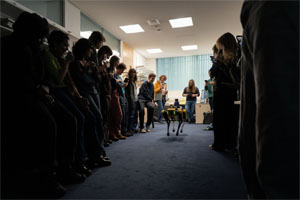
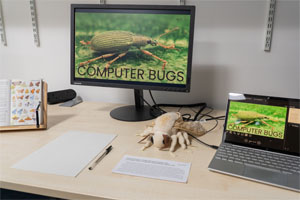
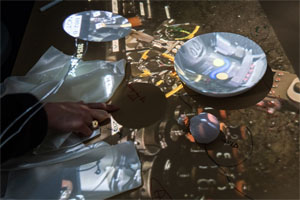
Photographs from the ‘Nature Buffering’ exhibition, curated as part of the Digital Ecologies MSc Course. Source: Karolina Uskakovych
Current Graduate Research Students
| Mari Arold | Looping forest: Analogue and digital mediations of landscape and identities in post-Soviet Estonia |
Selected Publications
Please get in touch if you are unable to access any of my publications and I can send you a copy.
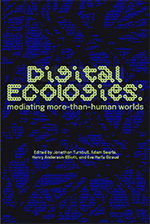
Journal Articles
2025
- Turnbull, J. forthcoming. Making sense of nuclear natures: Ecologies, Expertise, Aesthetics. Progress in Environmental Geography.
- Turnbull, J. (2025) Chornobyl-as-laboratory? The curious case of CTVT. East/West: Journal of Ukrainian Studies.
- Turnbull, J., Fry, T. and Lorimer, J. (2025) (Re)wilding London: Fabric, politics, and aesthetics. Transactions of the Institute of British Geographers.
- Stanley, T., Hirons, M., Turnbull, J., Lorimer, J., Kumeh, E., Hafferty, C., Anderson, L. and McDermott, C. (2025) Just nature recovery: A framework for centring multispecies and multi-dimensional justice in land management. Environmental Science and Policy.
2024
- Searle, A., Turnbull, J. and Oliver, C. (2024) Climate Cattle: Metabolic Intervention in the Good Anthropocene. Environmental Humanities.
- Hartman Davies, O., Turnbull, J. and Searle, A. (2024) Digital ecologies in practice. cultural geographies.
- Oliver, C., Turnbull, J. and Richardson, M. (2024) Claiming veganism and vegan geographies. The Geographical Journal.
- Searle, A., Turnbull, J., Hartman Davies, O., Poerting, J., Chasseray-Peraldi, P., Dodsworth, J., Anderson-Elliot, H. (2024) Glitches in the Technonatural Present. Dialogues in Human Geography, 14(2): 342-346.
2023
- Turnbull, J. and Saddington, L. (2023) Editorial introduction: Volume 3, Issue 3: The Roots of Routes. Routes 3(3): 149-154.
- Turnbull, J. and Barua, M. (2023) Living Waste, Living on Waste: a bioeconomy of urban cows in Delhi. Transactions of the Institute of British Geographers, 48(3): 474-490.
- Searle, A., Turnbull, J., Hartman Davies, O., Poerting, J., Chasseray-Peraldi, P., Dodsworth, J. and Anderson-Elliott, H. (2023) Glitches in the technonatural present. Dialogues in Human Geography.
- Turnbull, J., Searle, A. and Lorimer, J. (2023) Anthropause environmentalisms: Noticing natures with the Self-isolating Bird Club. Transactions of the Institute of British Geographers, 48(2): 232-248.
- Searle, A., Turnbull, J. and Adams, W.M. (2023) The digital peregrine: a technonatural history of a cosmopolitan raptor. Transactions of the Institute of British Geographers, 48(1): 195-212.
- von Essen, E., Turnbull, J., Searle, A., Jørgensen, F.A., Hofmeester, T.R., and van der Wal, R. (2023) Wildlife in the Digital Anthropocene: Examining Human-Animal Relations through Surveillance Technologies. Environment and Planning E: Nature and Space, 6(1): 679-699.
2022
- Turnbull, J., Searle, A., Hartman Davies, O., Dodsworth, J., Chasseray-Peraldi, P., Von Essen, E. and Anderson-Elliott, H. (2022) Digital ecologies: Materialities, encounters, governance. Progress in Environmental Geography.
- Unnithan Kumar, S., Turnbull, J., Hartman Davies, O., Hodgetts, T. and Cushman, S. (2022) Moving beyond landscape resistance: considerations for the future of connectivity modelling and conservation science. Landscape Ecology.
- Turnbull, J., Platt, B. and Searle, A. (2022) For a new weird geography. Progress in Human Geography, 46(5): 1207-1231.
- Turnbull, J. and Van Patter, L. (2022) Thinking-Together through Ethical Moments in Multispecies Fieldwork: Dialoguing Expertise, Visibility, and Worlding. ACME: An International Journal for Critical Geographies, 21(2): 147-171.
- Turnbull, J. and Searle, A. (2022) Filmmaking practice and animals' geographies: attunement, perspective, narration. cultural geographies, 29(3): 453-464.
- Van Patter, L., Turnbull, J., and Dodsworth, J. (2022) "More-than-human Collaborations" for Hacking the Anthropocene. feral feminisms, 10: 85-102.
2021
- Oliver, C., Ragavan, S., Turnbull, J., Chowdhury, A., Borden, D., Fry, T., Gutgutia, S. and Srivastava, S. (2021) Introduction to the urban ecologies open collection: A call for contributions on methods, ethics, and design in geographical research with urban animals. Geo, 8(2): 1-7.
- Turnbull, J. (2021) Weird. Environmental Humanities, 13(1): 275-280.
- Searle, A., Turnbull, J., and Lorimer, J. (2021) After the anthropause: Lockdown lessons for more-than-human geographies. The Geographical Journal, 187(1): 69-77.
2020
- Turnbull, J. (2020) Checkpoint dogs: Photovoicing canine companionship in the Chernobyl Exclusion Zone. Anthropology Today, 36(6): 21-24.
- Turnbull, J., Searle, A., and Adams, W.M. (2020) Quarantine encounters with digital animals: More-than-human geographies of lockdown life. Journal of Environmental Media, 1 (Supplement): 6.1-10.
- Searle, A. and Turnbull, J. (2020) Resurgent natures? More-than-human perspectives on Covid-19. Dialogues in Human Geography, 10(2): 291-295.
- Turnbull, J., Searle, A. and Adams, W.M. (2020) Quarantine urban ecologies. Cultural Anthropology, Fieldsights: 19 May.
Book Chapters
2025
- Turnbull, J. and Brown, K. (2025) Compounding Catastrophes in Polissya: Chornobyl’s Legacy Along the E40 Waterway. In P. Högselius and S. Evens (Eds.) The Nuclear-Water Nexus. Cambridge, MA: The MIT Press.
- Wrigley, C., Turnbull, J. and Searle, A. in press. Terraforming Terra. In Green Transitions.
2024
- Searle, A., Giraud, E., Turnbull, J. and Anderson-Elliott, H. (2024) Introduction: What is Digital Ecologies? In J. Turnbull, A. Searle, H. Anderson-Elliott and E. Giraud (Eds.) Digital Ecologies: Mediating More-than-human Worlds (pp. 1-28). Manchester: Manchester University Press.
2023
- Searle, A. and Turnbull, J. (2023) More-than-Human Reflections on Anthropause. In A. Franklin (Ed.) The Routledge International Handbook of More-than-Human Studies. London: Routledge.
- Turnbull, J. (2023) The Kyiv Thickets. In S. Dovzhyk (Ed.) Ukraine Lab: Global Security, Environment, and Disinformation Through the Prism of Ukraine. New York: Columbia University Press. Available here and here.
- Turnbull, J. and Brown, K. in press. Compounding Catastrophes in Polissya: Chornobyl's Legacy Along the E40 Waterway. In P. Högselius (Ed.) Nuclear-Water Nexus.
- Turnbull, J. and Searle, A. (2023) Digital Geographies and Ecologies. In T. Osborne and P. Jones (eds.) A Research Agenda for Digital Geographies. Cheltenham and Camberley: Edward Elgar Publishing.
- Adams, W.M., Searle, A. and Turnbull, J. (2023) Peregrine flights: the emergence of digital winged geographies. In Petri, O. and Guida, M. (eds.) Winged Worlds: Common Spaces of Avian-Human Lives. London: Routledge.
2022
- Eriksen, C. and Turnbull, J. (2022) Insure the volume? Sensing air, atmospheres, and radiation in the Chornobyl Exclusion Zone. In K. Booth, C. Lucas and S. French (eds.) Climate, Society and Elemental Insurance: Capacities and Limitations.
2021
- Alexis-Martin, B., Turnbull, J., et al. (2021) Nuclear Geographies and Nuclear Issues. In D. Richardson, N. Castree, M.F. Goodchild, A. Kobayashi, W. Liu and R.A. Marston (eds.) International Encyclopedia of Geography: People, the Earth, Environment and Technology.
Edited Special Issues
- Turnbull, J., Sperling, A., Searle, A., Platt, B. and Eades, G. forthcoming. Weird Geographies. Cultural Politics.
- Hafferty, C., Hartman Davies, O., Turnbull, J., Searle, A. forthcoming. Digital Dimensions of Nature Recovery. People and Nature.
- Wrigley, C., Turnbull, J. and Searle, A. forthcoming. Terraforming Terra. Geoforum.
- Turnbull, J. and Searle, A. (2024) Digital Ecologies in Practice. cultural geographies, 31(4): 509-517.
- Turnbull, J. and Searle, A. (eds.) (2020) The Other Animals. The Philosopher, 108(1). Including contributions from Bill Adams, Maan Barua and Anindya Sinha, Eva Giraud, Lori Gruen, Christine Korsgaard, Diane Morgan, and Cary Wolfe.
Public Scholarship
2025
- Semenik, O. and Turnbull, J. (2025) Woe to those people who are illiterate and do not understand anything. Solomiya: The Environmental Issue.
2023
- Hartman Davies, O., Turnbull, J., Duroux, N. (2023) Digital Ecologies and Bionic Natures: Praxis and Practice. Digital Ecologies Blog, 8 June. Also available from the Oslo School of Environmental Humanities website.
2022
- Ukraine Lab. (2022) Ukraine Lab: British Library workshop. British Library, 28 July.
- Торнбулл, Д. (2022) Київські хащі: що приховують зелені зони столиці. Українська Правда, 23 Вересня [переклад Ніни Мюррей].
- Turnbull, J. (2022) The Kyiv Thickets. The Ecologist, 22 September. [Part of Ukraine Lab writing residency and Ukrainian translation available in Українська Правда]. Public reading available online. Print copy available in Resurgence & Ecologist Magazine.
- Noemi Duroux with the Digital Ecologies team. (2022) The Slowness of Digital Ecologies in Practice. Digital Ecologies Blog, 19 September.
- Zarkh, N., Uskakovych, K., Turnbull, J., Krichevsky, B. Rachkovsky, E. and Melnik, D. (2022) The Dogs That Survived / Собаки, Що Вижили. Against Catastrophe: Ukraine Dispatch, 1.
- Turnbull, J. (2022) All That Breathes: An Interview With Shaunak Sen. Anthroposphere, 8.
- Turnbull, J. (2022) What happened to Robin? Compass, 5th April.
- Turnbull, J. (2022) Chornobyl dogs, Ukrainian zoos, and abandoned animals in Kyiv. Alookso, 4 April. [Korean translation available].
- Unnithan Kumar, S., Turnbull, J., Hartman Davies, O., Cushman, S. and Hodgetts, T. (2022) Minimal Ecologies. Digital Ecologies Blog, 23 February.
- Searle, A. and Turnbull, J. (2022) Reflections on the Anthropause. Goethe Institute.
2021
- Turnbull, J., Searle, A. and Jasper, S. (2021) Ecologies of Emptiness. Emptiness: Living Capitalism and Democracy After (Post)Socialism Blog, 30 April.
- Turnbull, J. and Oliver, C. (2021) Metabolic Ruminations with Climate Cattle: Towards a More-Than-Human Metabo-Politics. CRASSH: Re-Scaling The Metabolic Blog, 24 February.
- Oliver, C. and Turnbull, J. (2021) A Conduit for Value: More-Than-Human Experiments With Chicken Metabolisms. CRASSH: Re-Scaling The Metabolic Blog, 16 February.
- Searle, A., Turnbull, J., and Lorimer, J. (2021) What can geographers learn from the 2020 'anthropause'? Geography Directions, 10 February.
2020
- Searle, A., and Turnbull, J. (2020) Pitch invasion! Football felines. The Urban Field Naturalist.
- Turnbull, J. (2020) Mutant Firebugs. The Urban Field Naturalist.
- Turnbull, J., Searle, A. and Adams, W.M. (2020) Quarantine urban ecologies. Geography Directions.
- Turnbull, J. and Searle, A. (2020) Winged fragility: Flight from evolution to extinction. King's Review, 6: 50-55.
- Turnbull, J. and Malcolm, A. (2020) Mushrooms, Modern Therapeutics and the Psychedelic Renaissance. BlueSci, 46: 12-14.
- Turnbull, J. and Searle, A. (2020) Anthropo(s)cene V: Extinction. The Philosopher, 108(2): 107-111.
- Turnbull, J. and Searle, A. (2020) Anthropo(s)cene IV: Affect. The Philosopher, 108(1): 110-113.
2019
- Turnbull, J. and Searle, A. (2019) Anthropo(s)cene III: Matter/Materiality. The Philosopher, 107(4): 52-54.
- Turnbull, J. and Searle, A. (2019) Anthropo(s)cene II: Animals. The Philosopher, 107(3): 68-70.
- Turnbull, J. and Searle, A. (2019) Anthropo(s)cene I: Posthumanisms. The Philosopher, 107.2: 52-4.
- Alexis-Martin, B., Dyke, J., Turnbull, J. and Malin, S. (2019) How to save a sinking island nation. BBC Future, 15 August.
- Alexis-Martin, B., Dyke, J., Malin, S. and Turnbull, J. (2019) Climate crisis: migration cannot be the only option for people living on 'drowning' islands. The Conversation, 3 July.
- Turnbull, J. and Hedley, T. (2019) Radioactive Wildlife: Canids in the Chernobyl Exclusion Zone. Anthroposphere, 3.
2018
- Turnbull, J. and Hedley, T. (2018) Glaciers in Clay: Exploring melting glaciers through ceramics. Anthroposphere, 2.
- Turnbull, J. (2018) Religion and Spirituality in the midst of climate change: learning from indigenous perspectives. Anthroposphere, 1.
Reports
- Ukraine Lab. (2022) Ukraine Lab: British Library workshop. [Ukrainian translation available / Є український переклад].
- Turnbull, J. (2021) AJ Pressland Fund Winning Report. University of Cambridge Language Centre.
- Turnbull, J. (2019) British Academy Animal Welfare and the Posthumanities Workshop Report.
Dissertations
- Turnbull, J. (2017) Got Milk? Material Biopolitics and More-than-Human Health at the Gaushala. MSc Thesis, University of Oxford. [available on request].
Exhibitions
- With the Digital Ecologies MSc Collective. 2024 & 2025. Nature Buffering. University of Oxford.
- Uskakovych, K., Turnbull, J., Zarkh, N., Krichevsky, B., Rachkovsky, E. and Melnik, D. (2023) The Dogs That Survived / Собаки Що Вижили. The Cambridge Festival, University of Cambridge.
- Turnbull, J. and Searle, A. (2022) Nature Buffering. Digital Ecologies in Practice, University of Bonn.
- Turnbull, J. (2020) 'Contaminated Canids in the Chernobyl Exclusion Zone', in Visualizing Toxic Places Exhibition, Center for Ethnography, Platform for Experimental Collaborative Ethnography.
Media appearances and public engagement
- 'Онлайн резиденції й промоція України' (How online residences contribute to the popularisation of Ukrainian culture abroad), 25th May 2023. Available online.
- 'Thirty-minute birder column: meet the nest cam gang'. Suburban Wild UK, 8th June 2023. Available online.
- 'The Kakhovka Dam Collapse Is an Ecological Disaster'. Wired, 8th June 2023. Available here: https://www.wired.com/story/kakhovka-dam-flooding-ukraine/.
- 'The Dogs That Survived / Собаки Що Вижили'. BBC Radio Cambridgeshire, 23rd March 2023. Available online.
- 'More-than-human perspectives on COVID-19'. COVIDCalls podcast, 22 October 2021. Available online.
- 'Gone to the dogs'. University of Cambridge, 25 May 2021. Available online.
- 'Chernobyl Guards Befriend Abandoned Dogs In Exclusion Zone'. The Koala, 7 May 2021. Available online.
- 'The guards caring for Chernobyl's abandoned dogs'. BBC Future, 23 April 2021. Available online.
- Lockdown and Nature. BBC Radio 4: Reignite, 28 March 2021. Available online.
- Digital human-animal relations during lockdown. In https://arobase.substack.com/p/des-pomes-prdits-par-lordinateur, 11 February 2021.
- Digital human-animal relations during lockdown. In https://arobase.substack.com/p/des-animaux-en-direct-et-une-blogueuse, 28 January 2021.
- Virtual tourism to the Chernobyl Exclusion Zone. Lonely Planet, 24 April 2020. Available Explore Chernobyl virtually as the world marks the anniversary of the disaster.
- Interview with Essie Chen on Chornobyl fieldwork. Compass, CUGS Magazine, 2018.


